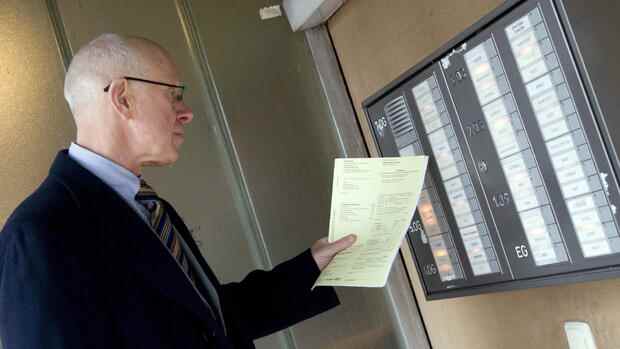A visit to the study on site may be disproportionate.
(Photo: obs)
Berlin “When the postman rings twice” – that was the name of a film drama from the early 1980s. In everyday life, however, such a ringing initially triggers joyful anticipation in many people. After all, a nice surprise could be waiting for them.
The situation is different, however, when the tax office in the form of the tax auditor is at the door and requests admission. In such a case, most people are more likely to ring the alarm bells and – whether justified or not – they see trouble coming.
A woman who works as a self-employed manager of a restaurant and management consultant received an unannounced visit from a so-called flank protection inspector in her private rooms. The reason for this apartment inspection was that she had claimed a home office for the first time in the income from freelance work.
For further verification, the responsible clerk had requested information, whereupon the woman had submitted a sketch of the apartment. Since one room was described as a study, but no bedroom was recognizable, the tax officer sent a tax investigator to inspect the apartment.
Top jobs of the day
Find the best jobs now and
be notified by email.
After the tax investigator had identified himself, the management consultant finally let him into her four walls without objection. However, she then appealed to the Münster Finance Court for a finding that this visit to the home without prior appointment was unlawful.
>> Read here: The submission of the tax return ends on 31.10. – How to extend the deadline
However, the judges dismissed her lawsuit. Because they interpreted the lack of objection at the front door as the woman’s consent and could therefore not see any serious violation of fundamental rights. There was therefore no interest in a finding.
Home inspection may be disproportionate
However, the Federal Fiscal Court saw this differently in its current decision on the case (Az. VIII R 8/19). Because the judges saw the danger of a repetition, since the woman was planning to move to a neighboring apartment. The tax investigator had already noted this in the files with the note that the room allocation there had to be awaited. In view of this note, the judges set the requirements low with regard to the risk of a repeat visit and thus came to the conclusion that the management consultant had a legitimate interest in the finding.
In addition, the Federal Fiscal Court considered the apartment inspection by the tax investigator to be disproportionate in the present case. According to her assessment, the tax office would have had milder means available to examine the open questions about the study. After all, the management consultant had already helped clarify the matter. In addition, she had never been negatively noticed for tax purposes in the past.
>> Read here: How the tax office finds out about tax evaders
Since the protection of the home is already laid down in the Basic Law and thus enjoys high priority, this also includes the home office. It follows that the tax office must spare a taxpayer the burden of an apartment inspection as far as possible. The hearing must therefore always come first. Afterwards, it is usually sufficient if the person in charge draws his or her conclusions from the information provided.
If an on-site visit is nevertheless unavoidable, it should be carried out by the assessment officer himself and not by a tax investigator, as this places less of a burden on those affected. In general, a visit must be announced.
Practical tip: What to consider in the home office
Taxpayers can claim a study in their private home under certain conditions in their income tax return. This applies to both entrepreneurs and employees. In your own home, however, a closed room must be available that is used exclusively as a study and forms the center of activities.
Anyone who has no other workplace available can apply all costs related to the home office. General costs such as electricity and heating are taken into account proportionately. For those who work mainly from home, the tax-deductible costs are capped at 1250 euros. If there is no room in the apartment that meets the strict criteria of a study, taxpayers can claim the home office flat rate. This amounts to a maximum of 600 euros per year.
Are you interested in this tax tip? You can find more articles at our cooperation partner Haufe.de.
More: Tax return and home office: When is my home office considered a study?
